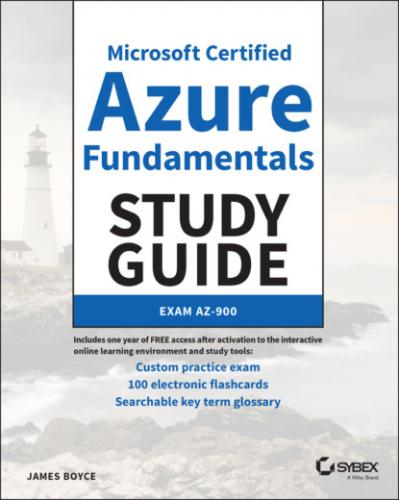What's Included in the Book?
This book consists of seven chapters plus supplementary information: a glossary, this introduction, flashcards, and the assessment test after the introduction. The chapters are organized as follows:
Chapter 1, “Cloud Concepts,” explores the basic concepts of cloud computing to lay the foundation for the rest of the book. Chapter 1 covers categories of cloud computing, the financial benefits of cloud computing, and the various cloud models available with Microsoft Azure.
Chapter 2, “Azure Core Services,” explores the core services available with Azure, including key concepts such as subscriptions and billing, tenants, resources, and resource management. The chapter begins the exploration of key Azure services, including virtual machines, storage, and data services.
Chapter 3, “Azure Core Networking Services,” begins with an explanation of basic networking concepts to create a framework for the discussion of Azure‐specific networking services. The chapter explores virtual networks, load balancers, VPN gateways, and content delivery networks.
Chapter 4, “Security, Compliance, Privacy, and Trust,” covers concepts, services, and solutions in Azure related to security,, compliance, privacy, and trust. Topics covered include Azure network security resources, authentication and authorization, and key Azure security services such as Security Center, Key Vault, and others. The chapter also covers governance methodologies, compliance resources, monitoring and reporting, privacy and compliance topics, and government implementations of Azure for the United States and China.
Chapter 5, “Azure Solutions,” covers services in Azure for Internet of Things (IoT), big data and analytics, artificial intelligence (AI), serverless computing, and DevOps.
Chapter 6, “Azure Pricing, Service Levels, and Lifecycle,” helps you understand subscriptions, ways to purchase Azure services, and how to estimate and manage costs in Azure. Pricing tools including the TCO Calculator and Pricing Calculator are explored, as are service level agreements (SLAs), ways to improve SLAs (and the potential effect of SLAs on cost), and other ways to manage cost in Azure.
Chapter 7, “Creating and Managing Azure Resources,” begins with an exploration of the tools you can use to create and manage Azure resources, including the Azure portal, PowerShell, the Azure CLI, the Azure Cloud Shell, and the Azure Mobile App. The chapter finishes with sections that step you through the process of creating several types of Azure resources.
Each chapter begins with a list of the objectives that are covered in that chapter. The book doesn't cover the objectives in order. Thus, you shouldn't be alarmed at some of the odd ordering of the objectives within the book. At the end of each chapter, you'll find a couple of elements you can use to prepare for the exam:
Exam Essentials This section summarizes important information that was covered in the chapter. You should be able to perform each of the tasks or convey the information requested.
Review Questions Each chapter concludes with review questions. You should answer these questions and check your answers against the ones provided after the questions. If you can't answer at least 80 percent of these questions correctly, go back and review the chapter, or at least those sections that seem to be giving you difficulty.
To get the most out of this book, you should read each chapter from start to finish and then check your memory and understanding with the chapter‐end elements. Even if you're already familiar with a topic, you should skim the chapter; Azure is complex enough that there are often multiple ways to accomplish a task, so you may learn something even if you're already competent in an area.
Recommended Home Lab Setup
Microsoft Azure is a cloud‐based offering, so you really don't need a home lab setup to learn about Azure. Instead, you need only a computer with a connection to the Internet and an Azure subscription for experimentation. As described in Chapter 7, you can create a free subscription in Azure and use a monthly credit included with that free subscription to work in Azure for up to a year without incurring any cost.
How to Contact Sybex
We want to ensure that you have the best resources and most up‐to‐date information as you take your Azure certification journey. On a periodic basis, visit www.wiley.com/go/Sybextestprep for updates, errata, and additional content as it becomes available.
Interactive Online Learning Environment and Test Bank
We've put together some great online tools to help you pass the AZ‐900 exam. The interactive online learning environment that accompanies Microsoft Certified Azure Fundamentals Study Guide: Exam AZ‐900 provides a test bank and study tools to help you prepare for the exam. By using these tools, you can dramatically increase your chances of passing the exam on your first try.
The online section includes the following:
Sample Tests Many practice questions are provided throughout this book and online, including the questions in the assessment test, which you'll find at the end of this introduction, and the review questions at the end of each chapter. In addition, we provide two bonus practice exams. Use these practice questions to test your knowledge of the study guide material. The online test bank runs on multiple devices.
Flashcards The online text bank includes 134 flashcards specifically written to test your knowledge. Don't get discouraged if you don't ace your way through them at first. The purpose of the flashcards is to help ensure that you're ready for the exam. And no worries—armed with the review questions, practice exams, and flashcards, you'll be more than prepared when exam day comes! Questions are provided in digital flashcard format (a question followed by a single correct answer). You can use the flashcards to reinforce your learning and provide last‐minute test prep before the exam.
Other Study Tools A glossary of key terms from this book and their definitions are available as a fully searchable PDF.
wiley.com/go/sybextestprep to register and get one year of free access
